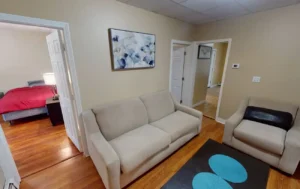
The deterioration of the hippocampus contributes to memory impairment, leading to heightened anxiety, flashbacks, and fragmented recollections of the past. This decline also hinders the formation of new long-term memories. The good news, ptsd memory loss blackouts however, is that this change isn’t permanent, as proper treatment can facilitate the restoration of the hippocampus. While it may not top the list of Post-Traumatic Stress Disorder symptoms, memory loss is a common symptom of PTSD.
- Essentially emotional content and memories are not stored together, making processing either difficult.
- Though memory loss from PTSD is perhaps not as recognized as other PTSD symptoms, it can nevertheless cause significant impairment of daily living.
- Sean Jackson is a medical writer with 25+ years of experience, holding a B.A.
- This may be contributing to further stress, self-blame, and tension in your family as attempts to make practical advancements are frustrated by the way your mind stores the past and present.
Coping Strategies for Flashbacks and Dissociation

Treatment can speed up that process and help you manage the effects of regaining those memories, too. You might not realize you have memory gaps until someone else asks or mentions something you should remember but can’t. Dissociative amnesia isn’t directly curable, but there are many treatment approaches that might help. One of the first steps is to remove or stop anything that might be causing or contributing to the amnesia. An example of this would be taking military personnel out of situations — especially combat — that might trigger or worsen amnesia.

Verbal declarative memory

While not everyone with PTSD will experience blackouts, for those who do, it can present significant challenges. Experts think that multiple factors can increase the risk of developing dissociative amnesia. That’s partly because the risk is cumulative, meaning it goes up when a person has more risk factors. When the trauma is longer-lasting, repeated or more severe, that usually makes this condition worse.
- Getting effective treatment after PTSD symptoms develop can be critical to reduce symptoms and improve function.
- If a car accident were the source of PTSD, someone might avoid the intersection where the accident took place.
- While not everyone with PTSD will experience blackouts, for those who do, it can present significant challenges.
- Dissociation is a defense mechanism that your mind can use to keep one or more of the above from working with the rest.
- Memory loss may not be the first thing that comes to mind when you think of posttraumatic stress disorder (PTSD).
Navigating PTSD: Meeting With a Psychologist or Psychiatrist for Trauma-Informed Care
Working with your doctor can help you decide which therapies could be the most beneficial for preventing or reducing your PTSD memory issues. PTSD treatment options often include taking medications and engaging in psychotherapy. Complementary and alternative therapies exist, as well, and include options like yoga and acupuncture.
- By Matthew Tull, PhDMatthew Tull, PhD is a professor of psychology at the University of Toledo, specializing in post-traumatic stress disorder.
- Post-traumatic stress disorder (PTSD) has many symptoms, one of which is memory loss.
- So, the traumatic experience that leads to memory loss may be different for everyone.
- Getting timely help and support may prevent normal stress reactions from getting worse and developing into PTSD.
Cognitive behavioral therapy for insomnia (CBTI) is recommended as a first-line treatment for chronic insomnia. Another helpful exercise for insomnia is to relax your muscles one by one, working your way down your body. If there are specific areas of your day-to-day life that you find difficult because of memory loss, using memory aids can help. Memory aids are tools that are designed to help accommodate people who experience memory difficulties. Most people use memory aids in their everyday life ― think calendars, notepads, and alarm clocks ― but for people with memory challenges, these aids can significantly improve their quality of life.